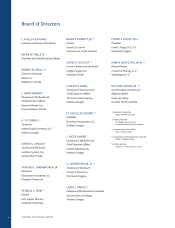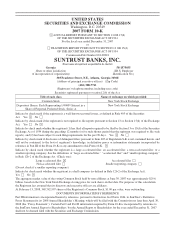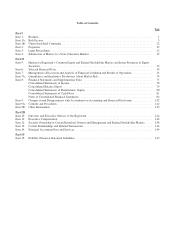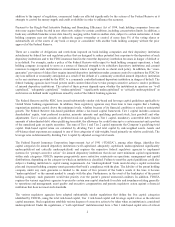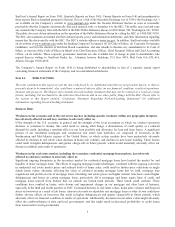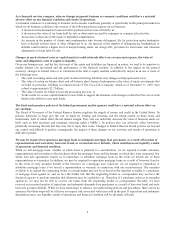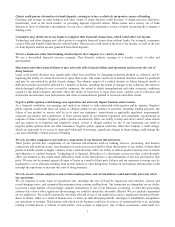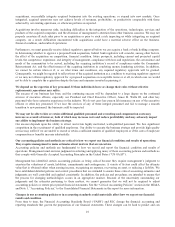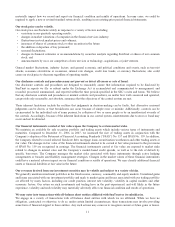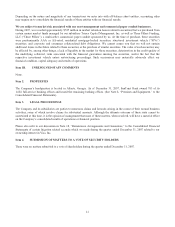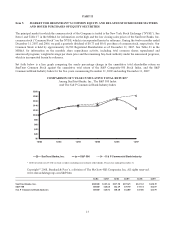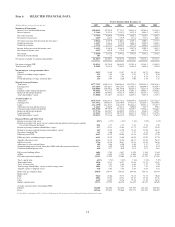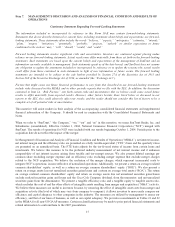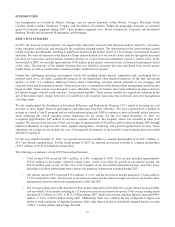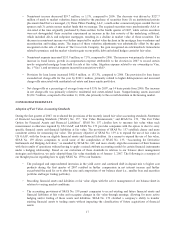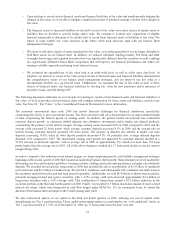SunTrust 2007 Annual Report Download - page 20
Download and view the complete annual report
Please find page 20 of the 2007 SunTrust annual report below. You can navigate through the pages in the report by either clicking on the pages listed below, or by using the keyword search tool below to find specific information within the annual report.diminished ability of us to operate one or more of our businesses, potential liability to clients, reputational damage and
regulatory intervention, which could materially adversely affect us.
We may also be subject to disruptions of our operating systems arising from events that are wholly or partially beyond our
control, which may include, for example, computer viruses or electrical or telecommunications outages or natural disasters,
or events arising from local or regional politics, including terrorist acts. Such disruptions may give rise to losses in service to
customers and loss or liability to us. In addition there is the risk that our controls and procedures as well as business
continuity and data security systems prove to be inadequate. Any such failure could affect our operations and could
materially adversely affect our results of operations by requiring us to expend significant resources to correct the defect, as
well as by exposing us to litigation or losses not covered by insurance.
We depend on the accuracy and completeness of information about clients and counterparties.
In deciding whether to extend credit or enter into other transactions with clients and counterparties, we may rely on
information furnished by or on behalf of clients and counterparties, including financial statements and other financial
information. We also may rely on representations of clients and counterparties as to the accuracy and completeness of that
information and, with respect to financial statements, on reports of independent auditors.
Industry Risks
Regulation by federal and state agencies could adversely affect the business, revenue and profit margins.
We are heavily regulated by federal and state agencies. This regulation is to protect depositors, the federal deposit insurance
fund and the banking system as a whole. Congress and state legislatures and federal and state regulatory agencies continually
review banking laws, regulations, and policies for possible changes. Changes to statutes, regulations, or regulatory policies,
including interpretation or implementation of statutes, regulations, or policies, could affect us adversely, including limiting
the types of financial services and products we may offer and/or increasing the ability of nonbanks to offer competing
financial services and products. Also, if we do not comply with laws, regulations, or policies, we could receive regulatory
sanctions and damage to our reputation. For more information, refer to Item 1,“Business,” of this Form 10-K.
Competition in the financial services industry is intense and could result in losing business or reducing margins.
We operate in a highly competitive industry that could become even more competitive as a result of legislative, regulatory
and technological changes, and continued consolidation. We face aggressive competition from other domestic and foreign
lending institutions and from numerous other providers of financial services. The ability of nonbanking financial institutions
to provide services previously limited to commercial banks has intensified competition. Because nonbanking financial
institutions are not subject to the same regulatory restrictions as banks and bank holding companies, they can often operate
with greater flexibility and lower cost structures. Securities firms and insurance companies that elect to become financial
holding companies may acquire banks and other financial institutions. This may significantly change the competitive
environment in which we conduct business. Some of our competitors have greater financial resources and/or face fewer
regulatory constraints. As a result of these various sources of competition, we could lose business to competitors or be forced
to price products and services on less advantageous terms to retain or attract clients, either of which would adversely affect
our profitability.
Future legislation could harm our competitive position.
Congress occasionally considers proposals to substantially change the financial institution regulatory system and to expand
or contract the powers of banking institutions and bank holding companies. Such legislation may change banking statutes and
the operating environment in substantial and unpredictable ways. If enacted, such legislation could increase or decrease the
cost of doing business, limit or expand permissible activities, or affect the competitive balance among banks, savings
associations, credit unions, and other financial institutions. We cannot predict whether new legislation will be enacted and, if
enacted, the effect that it, or any regulations, would have on our activities, financial condition, or results of operations.
Maintaining or increasing market share depends on market acceptance and regulatory approval of new products and
services.
Our success depends, in part, on the ability to adapt products and services to evolving industry standards. There is increasing
pressure to provide products and services at lower prices. This can reduce net interest income and noninterest income from
fee-based products and services. In addition, the widespread adoption of new technologies could require us to make
substantial capital expenditures to modify or adapt existing products and services or develop new products and services. We
may not be successful in introducing new products and services in response to industry trends or development in technology,
8


